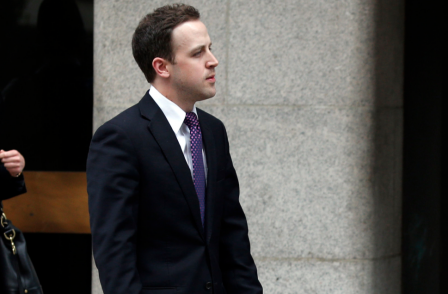
Looking at someone else’s phone messages may be nosey, it may even be a breach of their privacy under civil law. But is it a crime?
Technically it is. But it took a jury just a few hours yesterday to clear former Sun journalist Ben Ashford and to work out he wasn’t a thief or a computer hacker.
The big question is why it took the UK criminal justice system nearly two years, a hugely expensive investigation and trial to reach this conclusion.
Ashford is the fourth journalist arrested in connection with missing mobile phones to be cleared.
The Met said it was investigating a “suspected conspiracy involving the gathering of data from stolen mobile phones”.
In truth it appears they were just reporters doing their jobs.
Ashford was dragged into this because he was tasked in 2009 with meeting an individual called Sameena Rashid, 21, who said she had found a phone which contained ‘sexts’ sent between a married high-profile celebrity and a PR woman.
He met her in the evening and gave the phone back to the PR the following day.
 Sun journalist Chris Pollard, who took the call from the PR and wrote a memo based on his conversation, was arrested in a dawn raid in September 2012 only to be cleared nearly a year later.
Sun journalist Chris Pollard, who took the call from the PR and wrote a memo based on his conversation, was arrested in a dawn raid in September 2012 only to be cleared nearly a year later.
Rashid was given a caution for stealing the phone in 2010.
My understanding is that she was merely an intermediary and that another individual, whose name was given to police, is suspected to have stolen the phone along with a bag, camera, wallet and £45 in cash from a Manchester nightclub.
Police have made no effort to find the person who committed the theft, or find the stolen goods, but have spent two years trying to find out whether the person who returned the phone looked at what was on it.
Ashford clearly wasn’t a criminal. And scrolling through text messages on an unlocked mobile phone clearly wasn’t computer hacking.
He was initially charged with handling stolen goods, but faced trial under a different Proceeds of Crime Act offence normally reserved for money launderers. The judge said this was an unusual use of the legislation and asked prosecutors to reconsider, but they opted to proceed anyway. It would have been easier to get a conviction under POCA because the evidence threshold is lower.
Ashford has paid a heavy price for looking at those text messages.
First he had the indignity of being arrested and held in September 2012, then there was a year in limbo on police bail and then finally a criminal trial.
He lost his job, working for Mail Online in the US, and is now in journalism again working for the agency South West News in Plymouth.
He is on a third the salary he once was and must somehow build his career again from near the start at the age of 35.
That is going to be tough given the shadow which this affair has unfairly cast over him.
Ashford was arrested whilst undergoing three weeks training in London for Mail Online and lost his visa so he could not even return to the US to pick up his belongings.
The other strand of the phoney phones conspiracy dates back to 2010 when the mobile phone of MP Siobhain McDonagh was handed in to the offices of The Sun.
Sun journalists examined the phone, possibly to see if there was a ‘security breach’ style story to be written, and then handed it back to the MP.
 Sun reporter Rhodri Phillips never even set eyes on the phone, but was told to write a briefing email for the newsdesk based on a transcription of the material on it. He was arrested in a dawn raid on 19 July 2012 and spent 13 months on police bail before he was finally cleared.
Sun reporter Rhodri Phillips never even set eyes on the phone, but was told to write a briefing email for the newsdesk based on a transcription of the material on it. He was arrested in a dawn raid on 19 July 2012 and spent 13 months on police bail before he was finally cleared.
An un-named 37-year-old journalist arrested on 31 July 2012 in connection with a stolen mobile was told he would face no further action on 18 October 2013. One further Sun journalist remains on police bail.
McDonagh secured a huge privacy payout from The Sun in March 2013 as recompense for reporters looking at the information on her phone. Perhaps the PR person involved in the Ashford case will qualify for a similar award (she has lodged a privacy claim for £50,000).
But the criminal charges in the Ashford case feel trumped up and the prosecution disproportionate to the alleged wrong committed.
Why on Earth should the person who admitted stealing the PR's phone escape with a caution while the person who handed it back face trial? The inescapable answer is that Ben Ashford worked for The Sun and in the current climate that put a target on his back.
Finally, questions still remain as to why News Corp has thrown so many of its reporters to the wolves.
Ashford was arrested because of emails handed over to police by News Corp’s Management and Standards Committee.
I know the feeling amongst some of the many Sun journalists facing criminal action is that Ashford and others have been used as chaff to tie up the authorities with prosecutions of News Corp's foot soldiers rather than its generals.
Email pged@pressgazette.co.uk to point out mistakes, provide story tips or send in a letter for publication on our "Letters Page" blog
